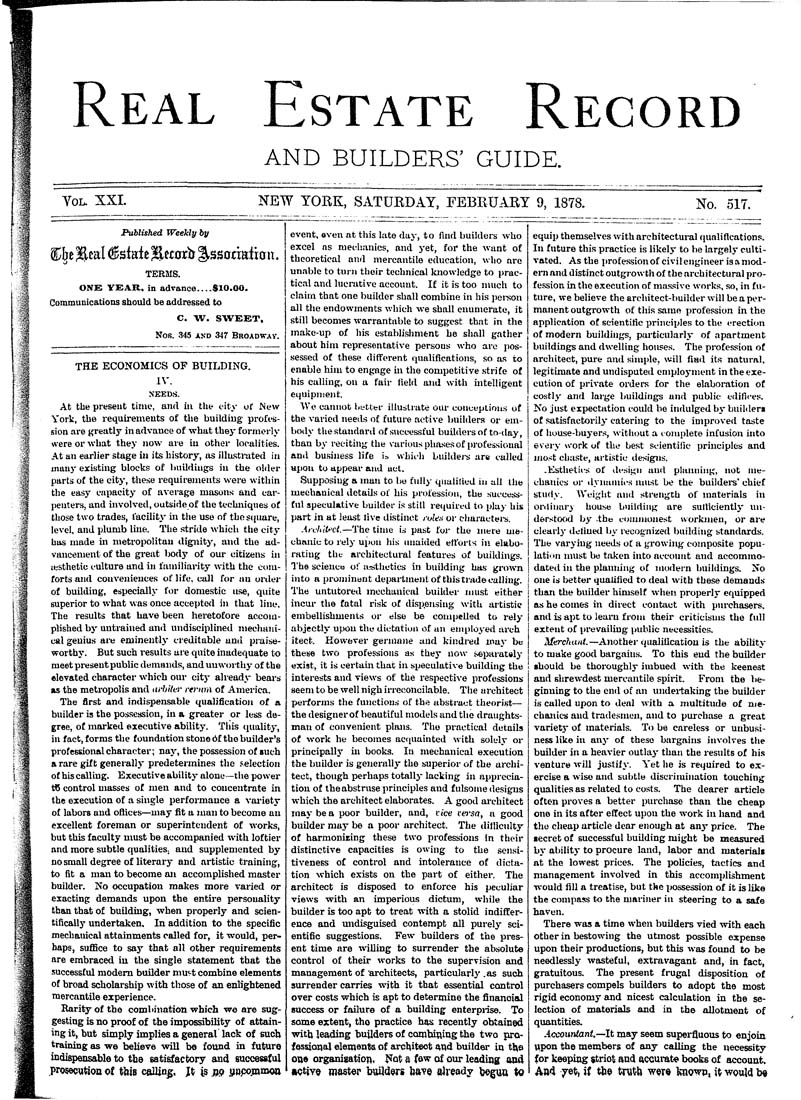Columbia University Libraries Digital Collections: The Real Estate Record
Use your browser's Print function to print these pages.
Real estate record and builders' guide: v. 21, no. 517: February 9, 1878

Text version:
Please note: this text may be incomplete. For more information about this OCR, view About OCR text.
Real Estate Record AND BUILDERS' GUIDE. Vol. XXL NEW YORK, SATUBDAY, FEBRUARY 9, 1878. No. 517, Published Weekly by TERJIS. ONE YEAR, in advance....SlO.OO. Communications should be addressed to C. -W. SWEET, Nos. 345 AND 347 Broadway. THE ECONOMICS OP BUILDING. IV. NEED.S. At the present time, and in the city uf Wew York, the requiremeuts of the building profes¬ sion are greatly in adv-anee of -what they formerly were or what they now are iu other localities. At an earlier stage in its history, as illasti-ated in man}' existing blocks of buildings in the older parts of the city, these requirements were within the easy capacity of average masons and car¬ penters, and involved, outside of the techniques of those two trades, facility ui the use of tho square, level, and plumb line. The stride which the city has made in nieti-opolitau digiiit}', and the ad¬ vancement of the great body of our citizens in testhetic culture and in familiarity with the coni- forts and convenience.'; of life, call for an order of building, especially for domestic use, quite superior to what was once accepted in that line. The results that have been heretofore accom¬ plished by untrained and undisciplined niecliani- cal genius are eminently cieditable and praise¬ worthy. But such results are quite inadequate to meet present public demands, and unworthy of the elevated character which our citj- already bears as the metropolis and arbiter rennn of America. The first and indispensable qualification of a builder is the pos-sessiou, in a greater or less de¬ gree, of marked executive ability. This iiuality, in fact, forms the foundation stone 6f the builder's professional character; nay, the possession of such a rare gift generally predetermines tlie .'.election of his calling. Executive ability alone—the power to control masses of men and to concentrate in the execution of a single performance a variety of labors and offices—may fit a man to become an excellent foreman or superintendent of works, but this faculty must be accompanied w-ith loftier and more subtle qualities; aud supplemented by no small degree of literary and artistic training, to fit a man to become aii accomplished master builder. No occupation makes more varied or exacting demands upon the entire persouality than that of building, when properly and scien¬ tifically undertaken. In addition to the specific mechanical attainments called for, it would, per¬ haps, suffice to say that all other requirements are embraced iu tbe single statement that the successful modem builder must combine elements of broad scholarship with those of an enlightened mercantile experience. Rarity of the combination which we are sug¬ gesting is no proof of the impossibility of attain¬ ing it, but simply implies a general lack of such training as we believe -wdll be found in future indispensable to tbe satisfactory and successful prosecution of this cftllin|f. Jt is ng i^apojmmon event, oven at this late day, to find builders who excel as mechanics, and yet, for the want of theoretical and mercantile education, who are unable to turn tbeir technical knowledge to prac¬ tical and lucmtive account If it is too much to claim that one builder shall combine in his pei-son all the endowments which w-e shall enumerate, it still becomes warrantable to suggest that in the make-up of his establi.shment he shall gather about him representative persons who arc pos- .sessed of these different qualifications, so as to enable him to engage in the competitive strife of his cidling, ou a fair field and with iutelligeut equipment. We cannot better illustrate our conceptions of the varied needs of future active builders or eni- botly tbe standard of succes.sf ul builders of to-day, than by recithig the various pha.ses of profes.sional and bu.siness life is which builders arc culled upon to appear aud act. Supposing a man to bu fully qimlilicd iu all the mechanical details of his profession, the success¬ ful speculative builder is still retjuired to play his part in at least tive distinct roles or charactei-s. .tiL-hitect.—The time i.-; past for the mere me¬ chanic to rely upon his unaided efforts in elabo¬ rating the architectural features of buildings. I'be scieucb of aaithetics in building ha,s grown into a prominent department of this trade culling. The untutored mechanical builder must eitiier incur the fatal risk of dispensing witL artistii? embellishments or else be compelled to rely abjectly upou the dictation of un employed arch itect. However germane und kindred may be thetse two professions as they now tveparatoly exist, it is certam that in speculative building the interests and views of the respective professions seem to be well nigh irreconcilable. The architect performs the functions of the abstract theorist— the designer of beautiful models and the draughts¬ man of convenient plans. Tho practical details of work he becomes aciiuainted with solely or principally ui books. In mechanical execution the builder is generally the superior of the archi¬ tect, though perhaps totally lacking in apprecia¬ tion of the abstruse principles and fulsome designs which the architect elaborates. A good architect may bea poor builder, and, i-(ce t&'sa, a goo